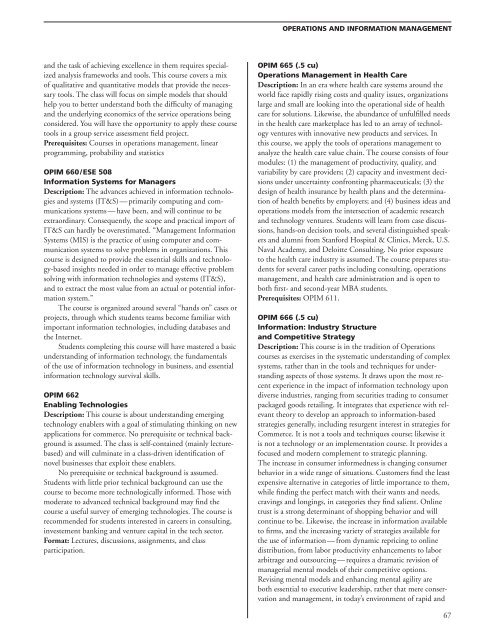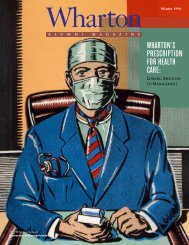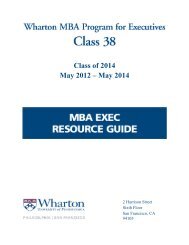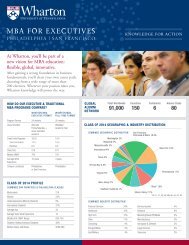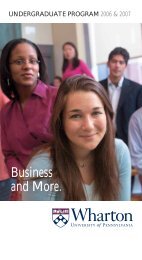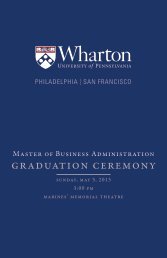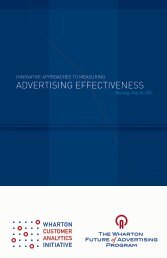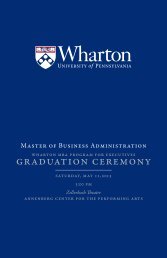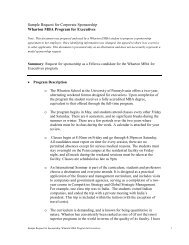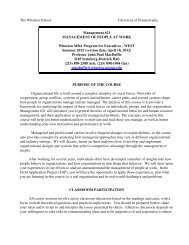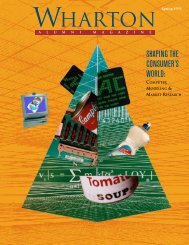Explore Options; Plan Your MBA Academic Program
Explore Options; Plan Your MBA Academic Program
Explore Options; Plan Your MBA Academic Program
Create successful ePaper yourself
Turn your PDF publications into a flip-book with our unique Google optimized e-Paper software.
and the task of achieving excellence in them requires specialized<br />
analysis frameworks and tools. This course covers a mix<br />
of qualitative and quantitative models that provide the necessary<br />
tools. The class will focus on simple models that should<br />
help you to better understand both the difficulty of managing<br />
and the underlying economics of the service operations being<br />
considered. You will have the opportunity to apply these course<br />
tools in a group service assessment field project.<br />
Prerequisites: Courses in operations management, linear<br />
programming, probability and statistics<br />
OPIM 660 / ESE 508<br />
Information Systems for Managers<br />
Description: The advances achieved in information technologies<br />
and systems (IT&S) — primarily computing and communications<br />
systems — have been, and will continue to be<br />
extraordinary. Consequently, the scope and practical import of<br />
IT&S can hardly be overestimated. “Management Information<br />
Systems (MIS) is the practice of using computer and communication<br />
systems to solve problems in organizations. This<br />
course is designed to provide the essential skills and technology-based<br />
insights needed in order to manage effective problem<br />
solving with information technologies and systems (IT&S),<br />
and to extract the most value from an actual or potential information<br />
system.”<br />
The course is organized around several “hands on” cases or<br />
projects, through which students teams become familiar with<br />
important information technologies, including databases and<br />
the Internet.<br />
Students completing this course will have mastered a basic<br />
understanding of information technology, the fundamentals<br />
of the use of information technology in business, and essential<br />
information technology survival skills.<br />
OPIM 662<br />
Enabling Technologies<br />
Description: This course is about understanding emerging<br />
technology enablers with a goal of stimulating thinking on new<br />
applications for commerce. No prerequisite or technical background<br />
is assumed. The class is self-contained (mainly lecturebased)<br />
and will culminate in a class-driven identification of<br />
novel businesses that exploit these enablers.<br />
No prerequisite or technical background is assumed.<br />
Students with little prior technical background can use the<br />
course to become more technologically informed. Those with<br />
moderate to advanced technical background may find the<br />
course a useful survey of emerging technologies. The course is<br />
recommended for students interested in careers in consulting,<br />
investement banking and venture capital in the tech sector.<br />
Format: Lectures, discussions, assignments, and class<br />
participation.<br />
OPERATIONS AND INFORMATION MANAGEMENT<br />
OPIM 665 (.5 cu)<br />
Operations Management in Health Care<br />
Description: In an era where health care systems around the<br />
world face rapidly rising costs and quality issues, organizations<br />
large and small are looking into the operational side of health<br />
care for solutions. Likewise, the abundance of unfulfilled needs<br />
in the health care marketplace has led to an array of technology<br />
ventures with innovative new products and services. In<br />
this course, we apply the tools of operations management to<br />
analyze the health care value chain. The course consists of four<br />
modules: (1) the management of productivity, quality, and<br />
variability by care providers; (2) capacity and investment decisions<br />
under uncertainty confronting pharmaceuticals; (3) the<br />
design of health insurance by health plans and the determination<br />
of health benefits by employers; and (4) business ideas and<br />
operations models from the intersection of academic research<br />
and technology ventures. Students will learn from case discussions,<br />
hands-on decision tools, and several distinguished speakers<br />
and alumni from Stanford Hospital & Clinics, Merck, U.S.<br />
Naval Academy, and Deloitte Consulting. No prior exposure<br />
to the health care industry is assumed. The course prepares students<br />
for several career paths including consulting, operations<br />
management, and health care administration and is open to<br />
both first- and second-year <strong>MBA</strong> students.<br />
Prerequisites: OPIM 611.<br />
OPIM 666 (.5 cu)<br />
Information: Industry Structure<br />
and Competitive Strategy<br />
Description: This course is in the tradition of Operations<br />
courses as exercises in the systematic understanding of complex<br />
systems, rather than in the tools and techniques for understanding<br />
aspects of those systems. It draws upon the most recent<br />
experience in the impact of information technology upon<br />
diverse industries, ranging from securities trading to consumer<br />
packaged goods retailing. It integrates that experience with relevant<br />
theory to develop an approach to information-based<br />
strategies generally, including resurgent interest in strategies for<br />
Commerce. It is not a tools and techniques course; likewise it<br />
is not a technology or an implementation course. It provides a<br />
focused and modern complement to strategic planning.<br />
The increase in consumer informedness is changing consumer<br />
behavior in a wide range of situations. Customers find the least<br />
expensive alternative in categories of little importance to them,<br />
while finding the perfect match with their wants and needs,<br />
cravings and longings, in categories they find salient. Online<br />
trust is a strong determinant of shopping behavior and will<br />
continue to be. Likewise, the increase in information available<br />
to firms, and the increasing variety of strategies available for<br />
the use of information — from dynamic repricing to online<br />
distribution, from labor productivity enhancements to labor<br />
arbitrage and outsourcing — requires a dramatic revision of<br />
managerial mental models of their competitive options.<br />
Revising mental models and enhancing mental agility are<br />
both essential to executive leadership, rather that mere conservation<br />
and management, in today’s environment of rapid and<br />
67


